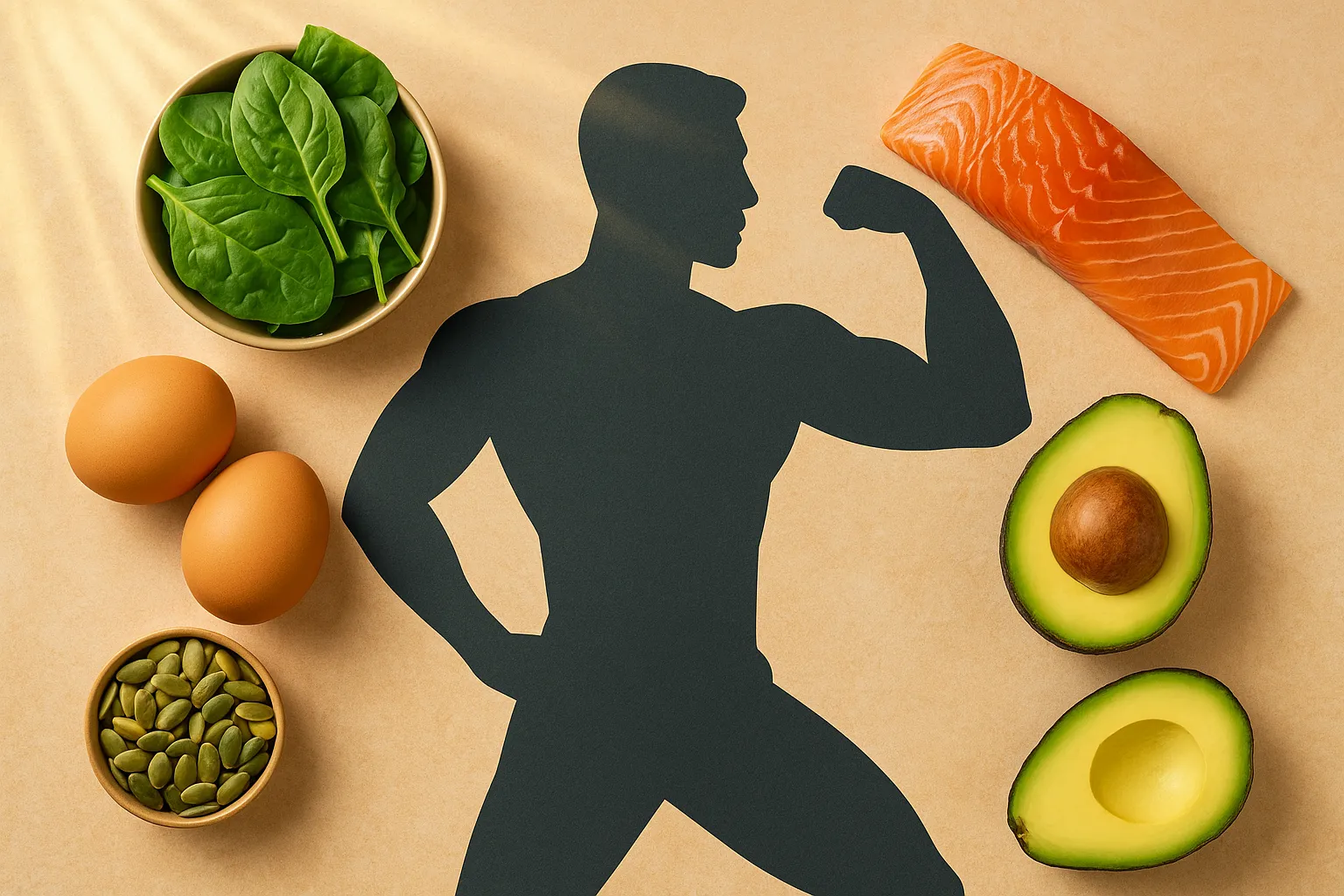Fueling the Male Body from Within
Testosterone is often seen as the defining hormone of masculinity. It supports muscle growth, libido, mental focus, motivation, and energy regulation. But testosterone isn’t just about physical performance — it’s a critical hormone that affects nearly every aspect of male health. When testosterone levels drop, the effects ripple through the entire system: fatigue sets in, mood declines, motivation wanes, and physical performance suffers.
While testosterone naturally declines with age — typically starting around age 30 — many men experience premature drops due to lifestyle factors. Among the most significant and overlooked? Nutrition.
What you eat doesn’t just influence your weight or muscle mass. It plays a central role in hormone production, energy metabolism, and overall vitality. The foods you consume every day either support your hormonal health or sabotage it. The good news is, you can reverse or slow hormonal decline by making smart, intentional dietary choices.
In this guide, we’ll explore how nutrition affects testosterone levels and daily energy, which nutrients support optimal hormone function, and what foods you should prioritize — or avoid — to feel and perform at your best.
Understanding Testosterone and Its Role in Energy
Testosterone is produced primarily in the testes and regulated by the brain’s hypothalamus and pituitary gland. It influences more than just sexual health — it’s closely tied to:
- Muscle and bone density
- Mood and cognitive clarity
- Fat distribution and metabolism
- Red blood cell production
- Motivation and stamina
When testosterone is low, men often report symptoms such as:
- Constant tiredness or afternoon energy crashes
- Irritability, mood swings, or lack of mental focus
- Low sex drive or erectile dysfunction
- Difficulty building or maintaining muscle
- Increased body fat, especially around the midsection
These symptoms are often mistaken for “normal aging” or stress, but in many cases, they’re tied to suboptimal testosterone and poor dietary support.
How Poor Nutrition Disrupts Hormone Balance
Certain dietary habits are known to negatively affect testosterone levels and overall energy. These include:
1. Excess Processed Sugar
High sugar intake leads to blood sugar spikes and crashes, which negatively affect energy and insulin sensitivity. Chronically elevated insulin can lower testosterone production and increase fat storage — especially visceral fat, which itself further suppresses hormone levels.
2. Low-Fat Diets
While excessive saturated fat is harmful, very low-fat diets can suppress testosterone. Fats — particularly healthy saturated and monounsaturated fats — are essential for cholesterol synthesis, which is the foundation for hormone production.
3. High Alcohol Consumption
Alcohol disrupts the endocrine system, increases estrogen levels, and interferes with liver function, which is essential for hormone regulation. Chronic or heavy drinking can significantly lower testosterone over time.
4. Overeating or Undereating
Both extremes can impair hormone production. Overeating — particularly processed carbs and fats — increases body fat and inflammation. Undereating or extreme caloric restriction puts the body into a survival state, reducing testosterone to conserve energy.
5. Deficiencies in Key Nutrients
Even if you eat enough calories, lacking certain micronutrients (like zinc, magnesium, or vitamin D) can lead to hormonal imbalances and fatigue. The modern diet is often energy-rich but nutrient-poor.
Key Nutrients That Boost Testosterone and Energy
To support optimal testosterone production and maintain high energy levels throughout the day, focus on these key nutrients:
1. Zinc
Zinc is critical for testosterone synthesis and sperm production. It also supports immune function and metabolic health.
Sources:
- Beef, lamb, oysters, pumpkin seeds, chickpeas, cashews
2. Vitamin D
Often called the “sunshine vitamin,” vitamin D acts like a hormone and plays a major role in testosterone regulation. Many men are deficient, especially in colder climates or office jobs with little sunlight.
Sources:
- Fatty fish (salmon, sardines), fortified milk, egg yolks, sunlight exposure
3. Magnesium
Magnesium helps regulate testosterone levels, supports muscle function, and improves sleep quality — all critical for energy and hormonal balance.
Sources:
- Spinach, almonds, black beans, avocados, dark chocolate
4. Healthy Fats
Testosterone is derived from cholesterol. Consuming adequate dietary fat — especially monounsaturated and omega-3 fats — supports healthy hormone levels.
Sources:
- Olive oil, avocados, nuts, fatty fish, eggs, coconut oil (in moderation)
5. Protein
Protein is essential for muscle maintenance and overall energy. Adequate intake supports metabolic function and helps prevent the loss of lean mass that can reduce testosterone levels.
Sources:
- Chicken, turkey, eggs, Greek yogurt, lentils, whey protein
Foods That Naturally Support Testosterone
Incorporating whole, testosterone-friendly foods into your daily routine can make a big difference in how you feel and perform. Here are some examples of foods that nourish your hormonal system:
- Eggs: Rich in healthy fats, protein, and vitamin D — a perfect hormone-supporting breakfast.
- Leafy Greens (spinach, kale): Packed with magnesium and antioxidants that lower inflammation and support hormonal function.
- Tuna or salmon: Loaded with vitamin D and omega-3 fatty acids, which reduce cortisol (stress hormone) and promote testosterone.
- Avocados: High in monounsaturated fats and vitamin B6 — both linked to healthy testosterone levels.
- Pomegranates: Studies suggest they may improve mood and increase testosterone levels.
- Brazil nuts: Excellent source of selenium, another important nutrient for testosterone production.
- Oats: Rich in B vitamins which aid in testosterone regulation and energy metabolism.
Eating these regularly helps create a nutritional environment that favors testosterone production while keeping energy levels stable and sustainable.
Timing, Consistency, and Eating Patterns That Support Hormonal Balance
In addition to what you eat, how and when you eat plays a major role in testosterone levels and daily energy. Hormones follow natural rhythms, and working with your body’s clock can help maintain healthy testosterone production throughout the day.
1. Don’t Skip Breakfast
Eating a protein-rich breakfast helps stabilize blood sugar levels and sets the stage for consistent energy. It also prevents midday crashes and late-night overeating — both of which negatively affect hormonal health.
A testosterone-supporting breakfast might include:
- 3 whole eggs with sautéed spinach and avocado
- Greek yogurt with pumpkin seeds and berries
- A smoothie with whey protein, banana, nut butter, and flaxseed
2. Time Your Meals Strategically
Eating balanced meals every 4–6 hours keeps insulin levels stable, which supports testosterone production and overall mood regulation. Long periods without food — especially during high-stress days — can lead to blood sugar dips, irritability, and low energy.
Men who practice intermittent fasting may still benefit from this style of eating, but should ensure that the feeding window includes nutrient-dense meals with sufficient fat, protein, and micronutrients.
3. Avoid Eating Large Meals Before Bed
Eating heavy, late dinners interferes with sleep quality — which in turn affects testosterone production. The majority of daily testosterone is released during deep sleep stages, and late meals can reduce both sleep duration and sleep depth.
Try to finish your last full meal 2–3 hours before bedtime, allowing time for digestion and better overnight recovery.
Foods and Habits That Suppress Testosterone
Just as some foods support optimal hormone function, others can suppress testosterone or increase estrogen levels — especially when consumed in excess or over long periods. Identifying and minimizing these foods can have a noticeable impact on energy, mood, and vitality.
1. Processed and Refined Carbohydrates
White bread, pastries, sugary cereals, and soda cause rapid blood sugar spikes followed by crashes — increasing cortisol and reducing insulin sensitivity. Chronically high insulin levels are linked to lower testosterone.
2. Trans Fats and Industrial Seed Oils
Trans fats (found in margarine, baked goods, and fried fast food) are inflammatory and reduce testosterone production. Highly processed seed oils like soybean, corn, and canola are often overly consumed and contribute to hormonal imbalance.
3. Excessive Alcohol
Alcohol disrupts sleep, increases estrogen, and damages liver function — all of which reduce testosterone. Binge drinking, in particular, can lead to a significant drop in testosterone for days.
4. Soy Products (in excess)
There is ongoing debate around soy, as it contains phytoestrogens (plant-based estrogens). While moderate soy intake is unlikely to cause problems for most men, excessive consumption — particularly of processed soy isolates in shakes and bars — may interfere with testosterone in sensitive individuals.
5. Plastic Packaging (BPA exposure)
While not a food, many packaged foods and water bottles contain bisphenol A (BPA), a chemical that mimics estrogen and has been shown to disrupt testosterone production. To reduce exposure, avoid microwaving plastic containers and choose BPA-free bottles and storage containers.
The Role of Sleep, Stress, and Lifestyle in Nutritional Impact
Nutrition does not work in isolation. Even the best diet won’t optimize testosterone if sleep is poor or stress is uncontrolled.
1. Sleep Quality
Testosterone is primarily produced during deep sleep, especially between 2:00–6:00 a.m. Even one week of poor sleep (under 6 hours per night) can cause a 10–15% drop in testosterone.
Support your nutritional efforts with a sleep routine that includes:
- Going to bed and waking up at the same time daily
- A cool, dark room with no electronics
- No caffeine after 2 PM
- A light dinner several hours before bed
2. Managing Cortisol
Chronic stress raises cortisol levels, which suppresses testosterone. Nutrition plays a role here too: a high-sugar, low-protein diet makes stress worse. Include magnesium-rich foods (like leafy greens and dark chocolate) and omega-3s (from salmon or chia seeds) to naturally lower cortisol.
3. Exercise and Movement
Strength training increases testosterone — but overtraining without adequate fuel and rest can reduce it. Support your workouts with post-exercise meals rich in protein and complex carbohydrates, and ensure recovery days are built into your schedule.
Supplementation: When Food Isn’t Enough
While food should always be the foundation, some men may benefit from supplements — particularly if bloodwork reveals deficiencies or symptoms persist despite dietary improvements.
Common Supplements for Testosterone and Energy:
- Vitamin D3: Especially in winter or for those who don’t get sun exposure.
- Zinc: For men with low levels or absorption issues.
- Magnesium (citrate or glycinate): Helps with sleep, muscle recovery, and testosterone support.
- Ashwagandha: An adaptogen that may lower cortisol and improve testosterone levels in stressed individuals.
- Fenugreek extract: May support libido and testosterone when used consistently.
- Creatine monohydrate: Safe and effective for energy, power output, and possibly hormonal support.
Note: Always consult with a healthcare professional before starting new supplements, and get lab work done to guide your approach. Random supplementation without data often wastes money and may do more harm than good.
A Sample Testosterone-Boosting Meal Plan
Here’s a simple day of eating that aligns with testosterone and energy optimization:
Breakfast:
- 3 whole eggs scrambled with spinach and olive oil
- Half an avocado
- A bowl of steel-cut oats with cinnamon and blueberries
- Green tea or black coffee
Mid-Morning Snack:
- Greek yogurt with a tablespoon of pumpkin seeds
- Small handful of Brazil nuts
Lunch:
- Grilled salmon over a mixed greens salad with cherry tomatoes, olive oil, and lemon dressing
- Quinoa or brown rice
- Sparkling water with lime
Afternoon Snack:
- Hard-boiled eggs or beef jerky
- Carrot sticks and hummus
- Herbal tea
Dinner:
- Grilled chicken or grass-fed beef
- Roasted sweet potatoes
- Steamed broccoli with butter or ghee
- Small square of dark chocolate (85%) for dessert
This plan provides quality fats, lean proteins, fiber-rich carbs, and essential micronutrients — all while avoiding processed junk and supporting hormone production.
Final Thoughts: Eat With Purpose, Live With Energy
Testosterone and energy levels are not fixed. While age plays a role, nutrition is one of the most powerful levers you can control to optimize your hormones and daily vitality. The modern diet, full of sugar, processed oils, and inflammatory ingredients, works directly against your biology — but it doesn’t have to be that way.
By eating real, nutrient-rich food consistently, managing your meal timing, staying hydrated, and cutting out testosterone-suppressing habits, you can restore balance to your body. Add sleep, stress reduction, and strength training to the mix — and you create a lifestyle where your mind and body feel sharp, focused, and energized.
It’s not about perfection. It’s about eating with purpose and fueling the man you want to be — strong, focused, and full of life.








